Recently my partner and I took a drive into deepest Devon, so deep we stood on a Hartland cliff looking at the Bristol Channel. My mother hailed from Devon, although that was south Devon. She was born in ‘John’s Cottage’ in Churston near Torquay, and one of my uncles was a bell ringer in the church there for over 40 years. My father’s roots were in North Wales, born into a Welsh language farming family. Mum and Dad met in the RAF and it was his postings that took me on an involuntary childhood tour of England and points abroad.
It was many years before I realised my childhood memories of square towered churches, rolling green hills and red earth were formed by the Devon countryside. My first school was in Newton Ferrers where I played triangle in the class band, the first musical instrument I failed to master. I was however a handsome ‘Buttons’ when the school did Cinderella as the Christmas panto.
We had first been posted into the RAF camp in Aden in the Yemen, a cruise by troopship when I was just a two-year-old. On the trip back some years later I wandered the ship, getting lost and being shepherded back to non-com land after wandering into officer territory. Still did better than our Border Service who failed to register my sisters arrival back in Britain (see the story in https://patrickgoff.com/art-2/when-will-they-ever-learn/ ) losing her in the bureaucratic mess that is Britain’s incompetent civil administration
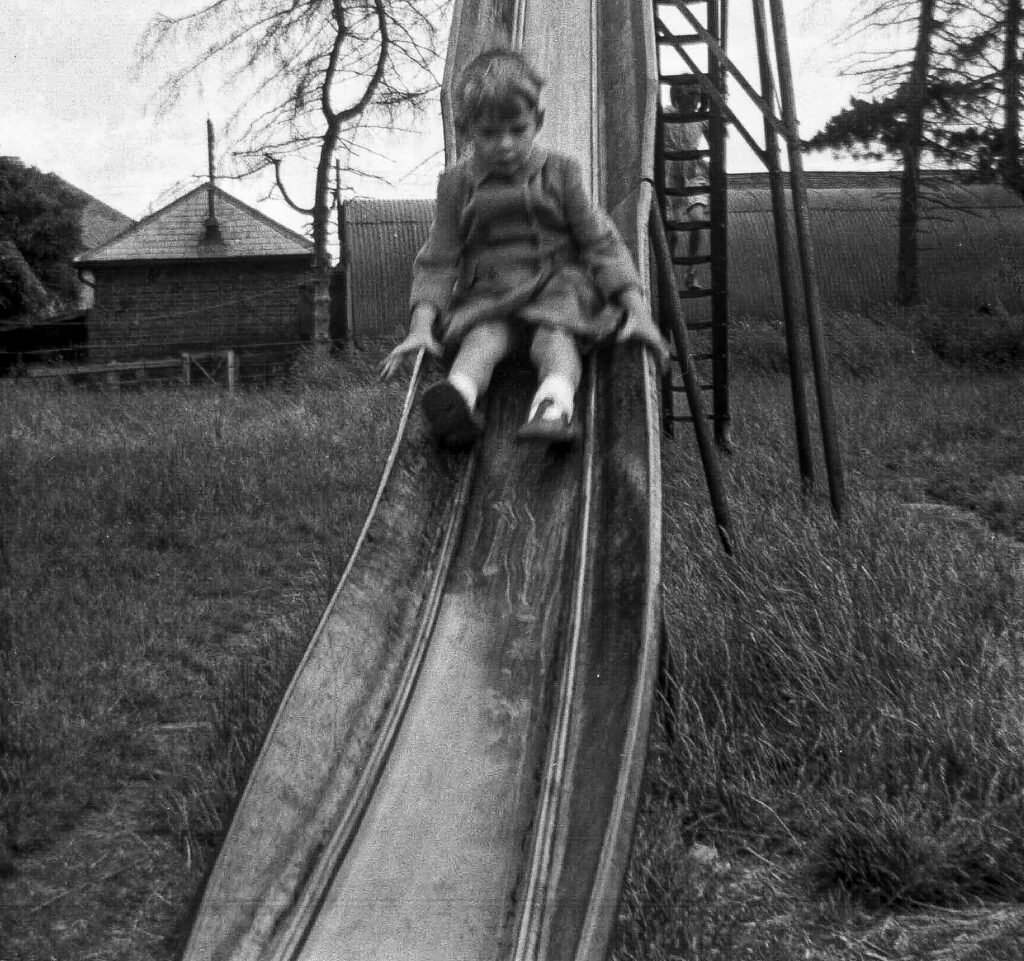
Colliton Cross, no longer an RAF camp in the 2000’s. Nissen huts and wooden huts made up the camp in the 1950’s, but it did have a playground for the children
Memories of Devon are of walks in the woods, finishing a giant jigsaw in the lobby of the wooden hutted medical centre where dad was a male nurse/trainee physio. Home was the RAF camp at Colliton Cross, and it was a long walk to school if the school bus failed to turn up. We lived in wooden wartime married quarter – literally a quarter of a wooden terrace of four houses where apparently acoustic performance was so good the stick crackling in the fire grate of the neighbouring home could be clearly heard when they lit their fire.
I remember the camp at Abingdon as postings followed. The married quarter there must have been pre-war, and I remember mum having to put wedges under the front door as heavily laden aircraft revved their propeller engines up before take-off, as the end of the runway was across the road in front of the house. Nearby was the training tower for paratroopers, none that I remember being “scraped off the runway like a lump of strawberry jam” as their song goes. School was in Abingdon where I was taught cross stitch, three of us kids then in a two-bedroom house before dad was posted to the RAF Hospital in Wroughton, in Wiltshire. By then I must have been approaching my seventh birthday and the three years that followed there are amongst the happiest I remember.
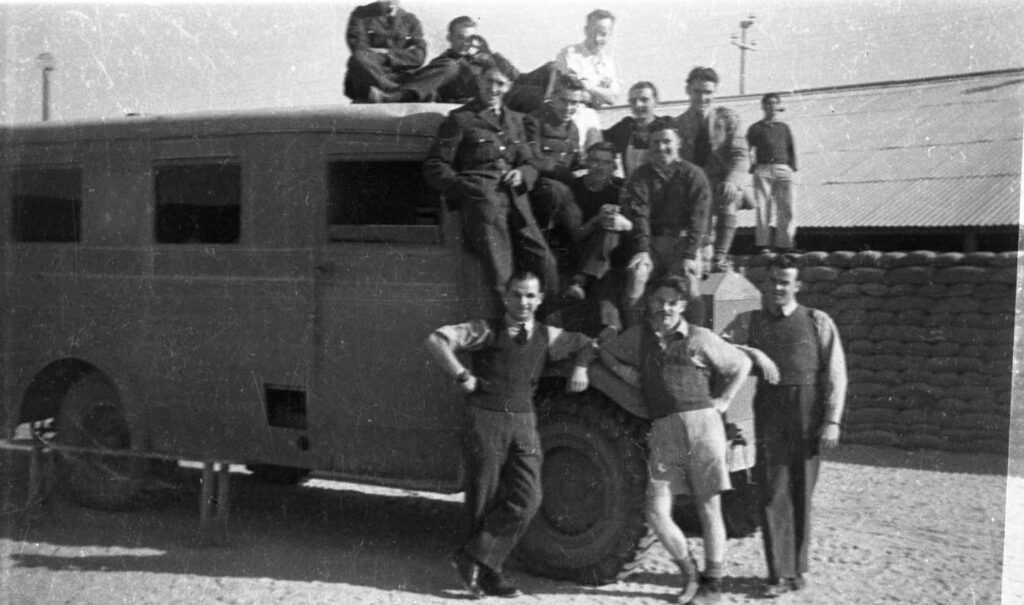
Dad (in white top center) was initially a medic in the Western Desert before remustering as a gunner after Crete
Wiltshire gave me memories like Devon, of green hills with clumps of majestic trees crowning them – growing my dad would say, from the remnants of the palisades early people placed for their own defence. In Wroughton I think dad finally made the transition from war to peace. He served as a male nurse in North Africa, then a rear gunner on Wellingtons based in Basra, so Aden must have had a degree of familiarity that was a bit uncomfortable for him. Wroughton at the time we were there was the last landing strip for the Lanacasters in which he also served in the UK in 1944/45 so a kind of full stop to his air gunnery career. He took me out on the hardstanding and broke into one so that at 8years old I could get a taste of what it was like shut in the rear turret…It was also where I first experienced the power and beauty of a Vulcan taking off.
The walk from school was a sensory sensation, as was much of the explorations of woods and the Wiltshire Downs. Memories linger of the scent of sap from hazel saplings, the smell of a field of ripe wheat in a hot summer sun, the fresh wet smell after a rainfall. I remember the quizzical curiosity of the gamekeeper’s fence where hung dead critters considered pests – the rapacious crows, the squirrels and fox all hung to deter similar. I recently watched two crows take down a pigeon in flight, and only yesterday saw one hunting a squirrel in the garden trees. Life and death were evident living in the country, emphasised when an outbreak of foot and mouth led to a furnace of a trench as carcasses of cows were burned in sight of the house.
My sister was five and my brother two when we were I Wroughton, but as an active 6 to10 year old I spend much of my time ‘running wild’. Dad had been brought up a country boy and he delighted in walking me back from the village to the camp telling me what I was looking at, showing me baby owls in a nest, teaching me to recognise hips and haws, where to find hazel nuts and letting me make bows and arrows. A nature book gift with black and white photographs was added, to delight.
Those were the years for recovery for both the country and those of my parent generation. Mum had served too as a teleprinter operator in the WRAF, and on one occasion was caught in a V2 explosion in London. She also hated shelter life. The years following the war were hard. Rationing did not end when the war did. There was a coal shortage, some very hard winters. Even school meals reflected shortages of basics like potatoes, some school meals being replace by lettuce sandwiches. I remember the delight of being given a ha’penny pocket money when sweet rationing was first lifted, my ha’penny buying me two aniseed balls and a gobstopper. Polio vaccine given to each of us on a sugar lump.
Dad stayed on in the RAF, remustering from WO AG to male nurse AC2 the RAF training him as a physiotherapist. Dad bought his first car, a prewar Morris, but we didn’t use it much. On one occasion caught in it in the rain when the wipers failed, he cut a potato in half and wiped the windscreen, the starches in it acting as water repellent so we could get home. We had no television at first, and my first experience of watching TV was the black and white set in the sergeant’s mess, sitting on my dad’s knee to watch the coronation of Queen Elizabeth the 2nd. Strange how the period of Britain’s greatness can be measured by the two female monarchs. Charlie-boy seems to be happy to spout globalist rubbish and contribute to Britain’s spiritual decline, ignorant of the greatness of the ‘Great Elizabethan Age’ from the 1558 until 1958, over 400 years of literature, art, music, industry and agricultural development contributing to the wellbeing of humanity buttressed by the morality and values of a strong Christian church.
I knew of none of this as a junior although I absorbed my father’s loyalty to his country and his family, helped by an education system that started with morning prayers, ‘assembly’, taught me to use English, taught English history and literature, and taught English folk songs and traditions – values thrown out by so-called ‘progressives’ who are usually rootless and believe in nothing except their own aggrandisement. We schoolkids didn’t worry about our sexuality but rather were we cowboy or indian, roundhead of cavalier and would a .303 rifle bullet fire if you hit the end hard with a nail (an experiment fortunately stopped after the second attempt when a teacher noticed what we were trying to do).
Without TV (although we had the Goon shows, Round the Horne, the Navy Lark and Jat Ace Logan on radio) we boys were frequently roped in to make up numbers for cricket matches with our service dads (on one occasion dad smashing a boundary which I foolishly stopped with my nose.) We flew box kites (liberated from the ditching store on the redundant Lancasters), walked from the camp up to the Ancient Britons fort on top of the downs, digging into its chalk bank looking for flint arrow heads. We made dens in the woods, played hide and seek and generally were hugely active outdoors. It was a wonderful, magical time, imagination powered by the printed page when the weather stopped outdoor delights.
All this brought back to me by my Christmas gift from my ever-loving. She had managed to find a copy of a 1948 book my father used to read to me, and it brought tears to my eyes to hold it and read it now. What magic books cast – will future generations seek out early episodes of Dr. Who and watch with tears in their eyes as they remember hiding behind the sofa when it first appeared on their black and white telly? A book digs into the unconscious, requires active participation by the reader’s imagination, stimulates, where today’s generations are passive recipients of the garbage that pours from their screen hypnotically.
I had some serious operations whilst at Wroughton and there was also an outbreak of dysentery all of which meant hospitalisation at a critical time.. This impacted my learning and the headmistress of the Junior School saw enough in me to give additional Saturday tutoring to ensure I passed the eleven plus. From the innocence and fun of country Junior school I was to move on to the dubious promise of an urban Grammar school…
To be Continued…
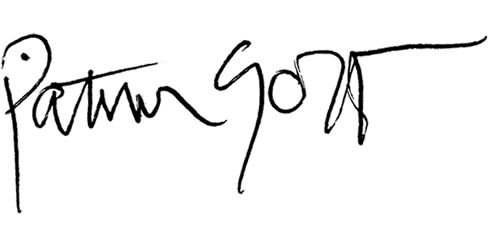
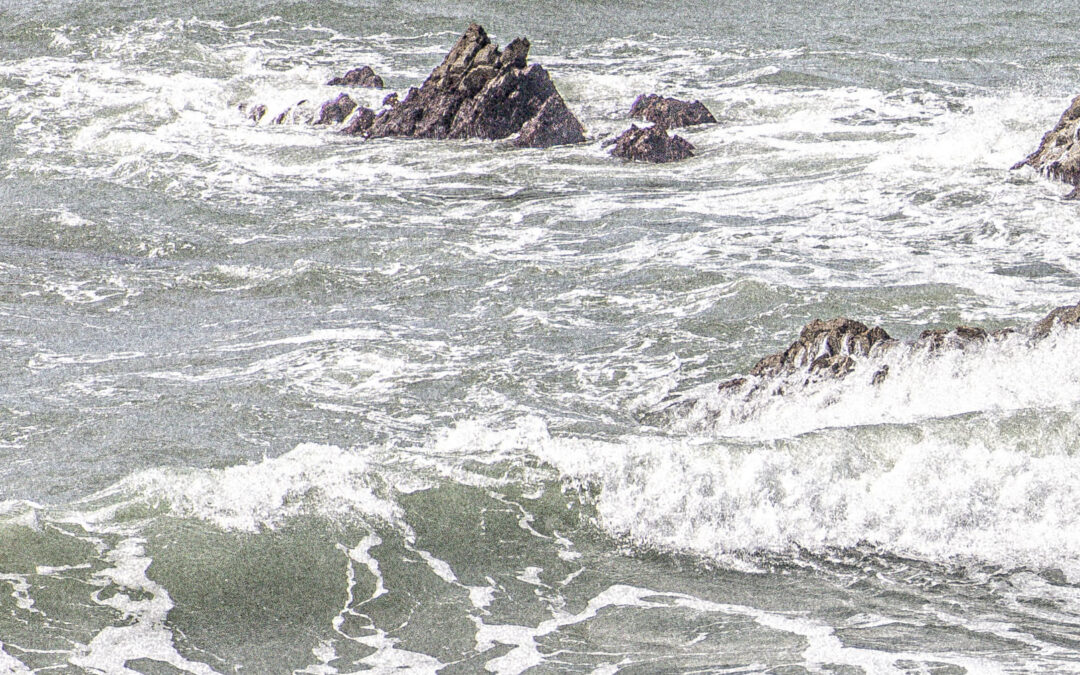
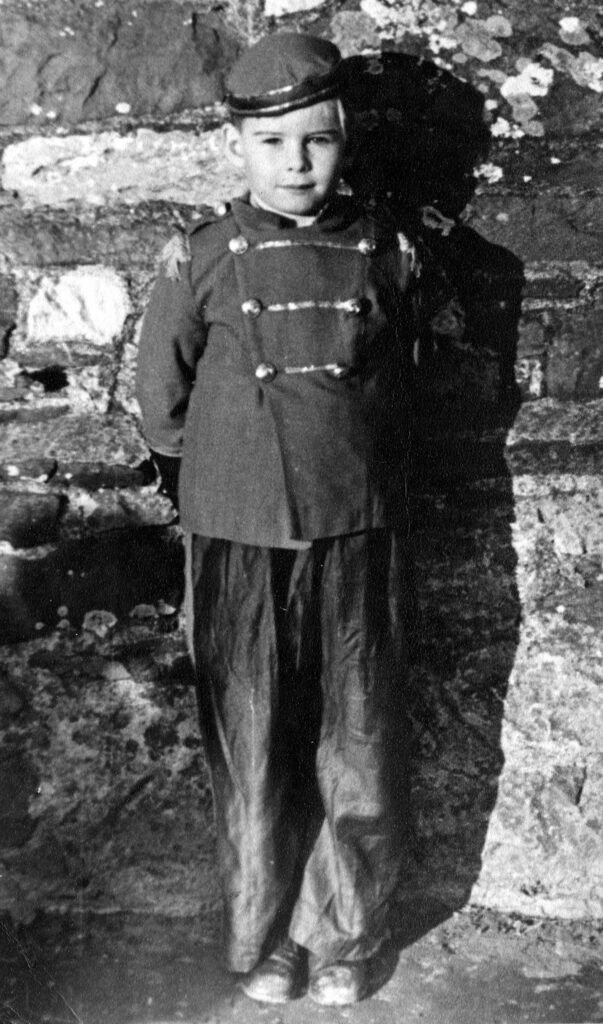
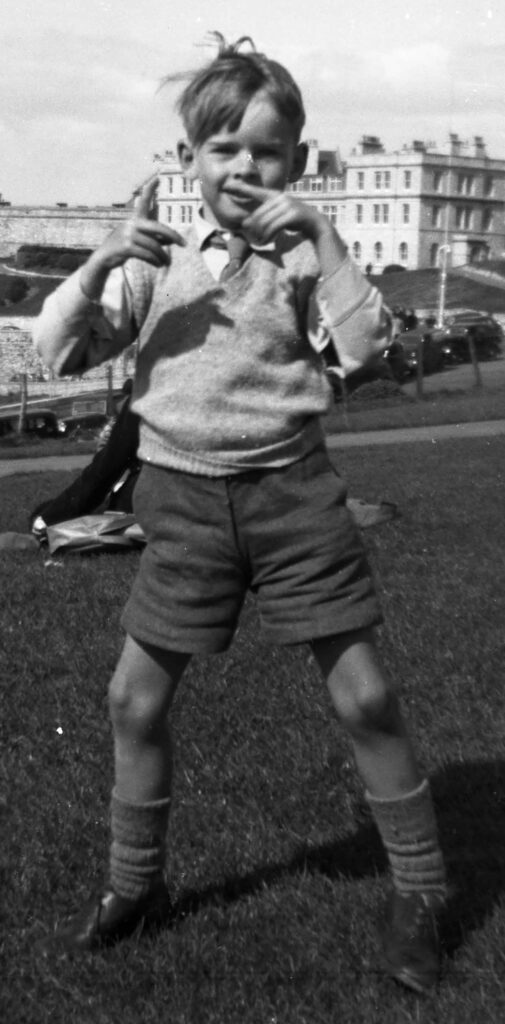
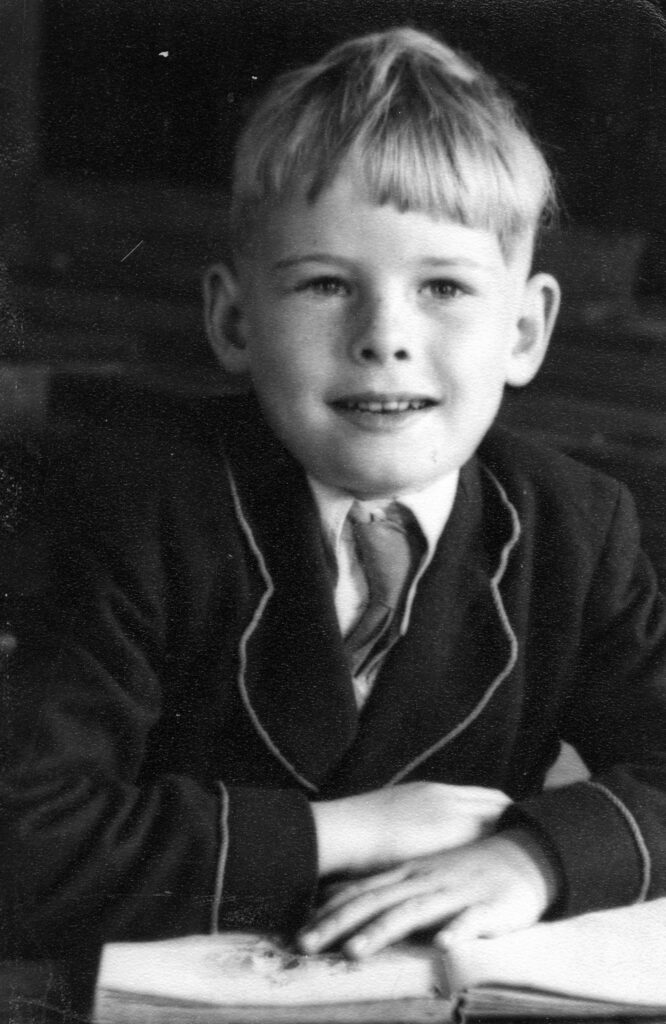
Recent Comments